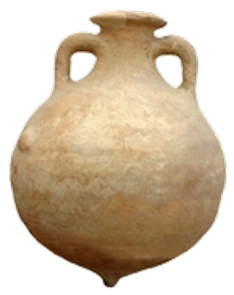
| Home | FAQs | Book Contents | Updates & News | Downloads |

Monte Testaccio is a hill in Rome, at about 35m (115ft) high it is constructed entirely from the remains of about 53 million amphorae (the pots they used to transport olive oil in ancient times). Since the earliest pots are at the bottom of the heap the date that the Romans started the dump is hard to know, some suspect it was about 100 BC, but the bulk of the hill was created in the century up to 250AD. It has been estimated that, at around that time, the Roman state imported more than 7 million litres of olive oil every year (mostly from Spain). So each year about 130,000 large, used and smelly clay vessels had to be disposed of. The oil impregnated the pots during the sea voyage and went rancid so domestic use was out of the question, and for the same reason they couldn't be used as building material. So the Romans carried them up the hill, smashed them into pieces that they organised in layers and scattered caustic lime over them (to reduce the smell).
After the 250s they stopped adding to this dump, and no one really knows why. Maybe relocation of the wharfs on the river Tiber or a new smaller design of amphora made the practice unnecessary. However, the theory I like best is that the potters started glazing the insides of the amphora. At a stroke they could be properly cleaned after being used, the rancid olive oil was no longer a problem and old pots became available for domestic use, building material, or even shipping back to transport more olive oil.
I am sure the reason why it took more than 100 years to come up with this, I think rather obvious, innovation was because no one was seeing the "big picture". The imperial civil servants had to dispose of the old containers because of their smell, they just found the quickest way to do that. In Baetica (the Roman province that is roughly the same as modern day Andalucia in Southern Spain) the olive oil farmers accepted the cost of buying all those pots as a necessary overhead when shipping to Rome, if they wanted the big city prices that was the cost they had to pay. The one group that had the skills to come up with this idea, that is the local potters, were precisely the people that had most to lose if it was implemented. Glazing the insides would complicate making amphorae reducing the profit per pot, and, even if they managed to persuade the customers, it would result eventually in reduced sales. Any apprentice potter suggesting such a thing would quickly be convinced to keep quiet.
Any innovation has winners and losers, if the current incumbents won't benefit from your new idea then you should expect them to apply every avenue to preventing change. We can all list quite a few examples where obviously beneficial new approaches have been stifled by those with interests in the status quo. When you are comfortable with current techniques it's easy (and lazy) to convince yourself that any disruption would be a disaster. When innovations are suggested we need to see them in the bigger context, otherwise we'll just keep on building our own mountains of broken pots.
Article 68 |
Articles |
RSS Feed |
Updates |
Intro |
Book Contents |
All Figures |
Refs |
Downloads |
Links |
Purchase |
Contact Us |
Article 70 |